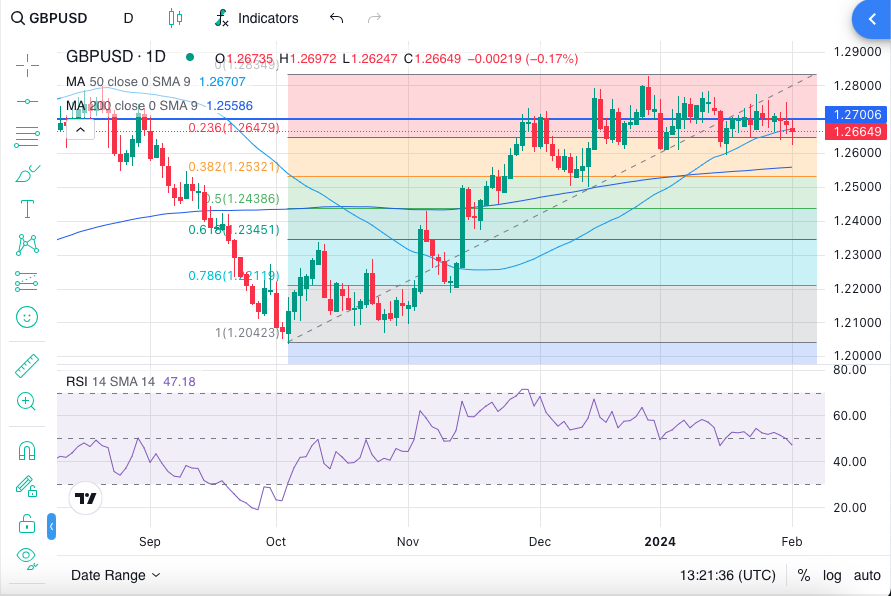-
Best Forex Brokers
Our top-rated Forex brokers
-
NGN Trading Accounts
Save on conversion fees
-
Brokers for Beginners
Start trading here
-
Forex Demo Accounts
Learn to trade with no risk
-
ECN Brokers
Trade with Direct Market Access
-
No-Deposit Bonuses
Live trading with no deposit
-
High Leverage Brokers
Extend your buying power
-
Lowest Spreads Brokers
Tight spreads and low commissions
-
Islamic Account Brokers
Best accounts for Muslim traders
-
Market Maker Brokers
Fixed spreads & instant execution
-
MetaTrader 4 Brokers
The top MT4 brokers in Nigeria
-
MetaTrader 5 Brokers
The top MT5 brokers in Nigeria
-
TradingView Brokers
The top TradingView brokers
-
cTrader Brokers
The top cTrader brokers in Nigeria
-
Forex Trading Apps
Trade on the go from your phone
-
Copy Trading Brokers
Copy professional traders
-
All Trading Platforms
Find a platform that works for you
The big news of the day, 1st February 2024, is the Fed’s decision to keep rates at 5.25%. This shocked absolutely no one, but in comments following the decision, Jay Powell, Chairman of the Federal Reserve, gave his clearest signal yet that the chances of a rate cut at the FOMC’s next meeting in March were slim:
“We’re going to be data dependent, we’re going to be looking at this meeting by meeting. Based on the meeting today, I would tell you that I don’t think it’s likely that the committee will reach a level of confidence by the March meeting to identify March as the time to do that [cut rates]. But that’s to be seen… when you ask me about the near term, I hear that as March… that’s probably not the most likely case, or what we would call the base case.”
So what would change the base case? The agreement among most analysts is that employment is the answer. Traders will be looking to tomorrow’s NFP report for a strong signal that the US labour market is weakening, though without much conviction. There have been signs of weakness in the jobs market in recent weeks, but this has yet to feed into a slowdown in GDP growth or consumer spending. Perhaps this is about to change. I wouldn’t hold my breath.
It seems that I am not the only one to feel this way. Following the announcement, the USD – as represented by the DXY index – made gains against other currencies, before falling back again. Traders are wary, we’ve been on this “data dependent” road for almost a year now and the market’s attempts to predict the US economy’s strength and the Fed’s responses have failed repeatedly.
On the other side of the Atlantic, there is trouble brewing in the UK where the Bank of England Monetary Policy Committee (MPC) met today to decide on interest rates. The GBP/USD has been under increasing pressure in recent days and with inflation still sitting at 4%, double the desired rate of 2%, the MPC was faced with a tough decision.
The UK has consistently underperformed its global peers in terms of inflation reduction, consumer spending, job growth and GDP growth over the past 12 months. With inflation still running too hot for comfort, the UK economy is at real risk of “stagflation”, the dreaded combination of high inflation and economic stagnation. So, should the MPC start cutting rates in an effort to boost economic growth, despite the inflationary pressures? Or should they keep rates high to combat inflation, worsening the chances of any recovery?
Markets firmly believed that the MPC would keep rates on hold today, which they did. This leant temporary support for the GBP/USD but will also put further pressure on the beleaguered economy. How long will high interest rates keep the GBP afloat despite a weak economic backdrop? Not long, in my opinion, especially as the recovery picks up in the EU and the USA.
Technical Analysis
After closing the second consecutive day in the red, the GBP/USD continued even lower on Thursday morning, falling below the support of the Fibonacci 23.6% level of the latest uptrend to a fresh weekly low of 1.2624. Following the BoE’s unsurprising “Super Thursday” decision to hold rates, the pair recovered somewhat, finding the support of the 50-day MA (turquoise) at 1.2670.

With a week or more of leggy candles and with the RSI sitting at around 50, the price action reflects the indecision in the market. All eyes will be on the Nonfarm Payrolls data which may shed light on potential market moves.
Any downside moves could see 1.2600 (psychological level) targeted before moving to 1.2540 (the Fibonacci 38.2% level). A build-up of bullish momentum could see resistance at 1.2700 (psychological level and recent resistance), before 1.2760 and 1.2780.
































